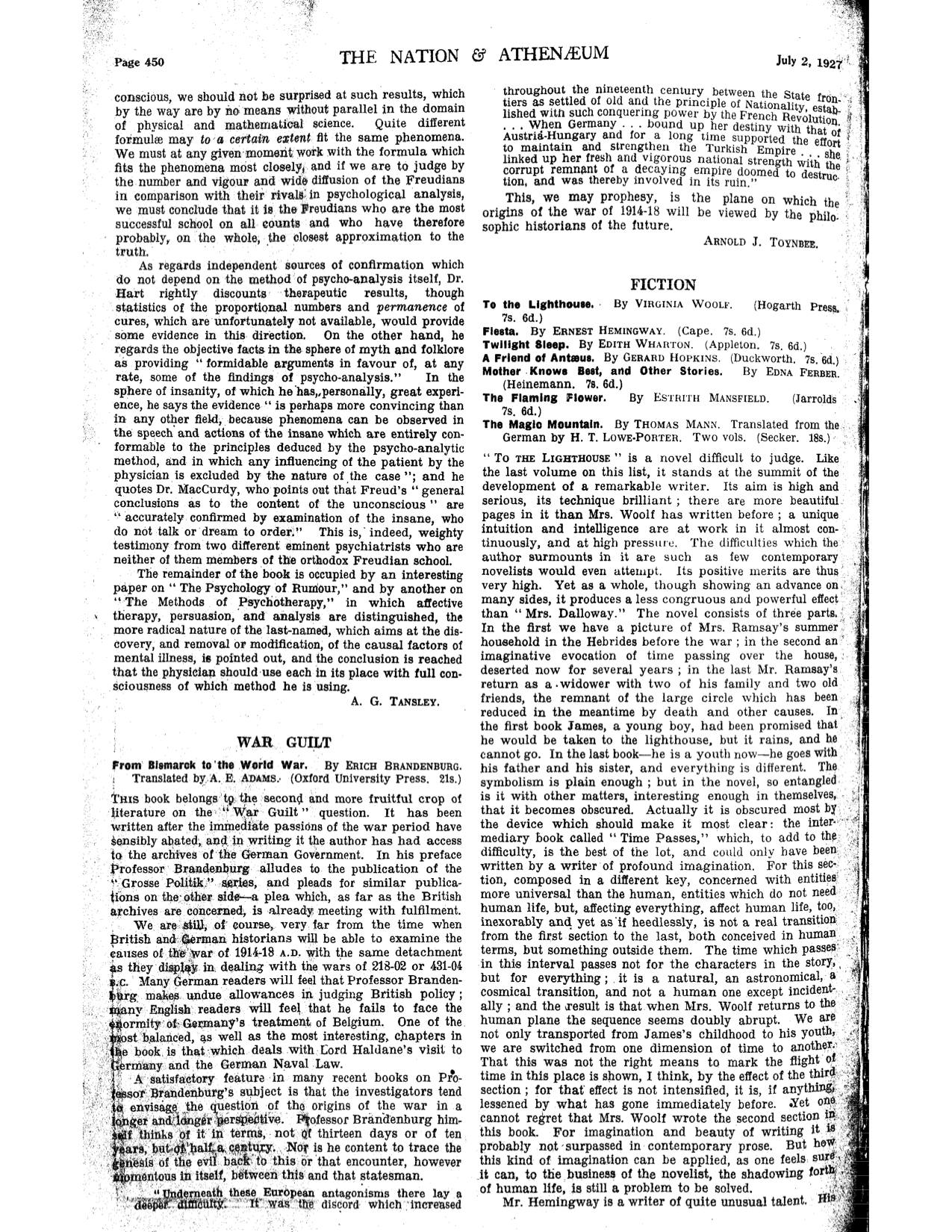
Edwin Muir. The Nation and the Æthenæum. July 2, 1927. pp.451-52.
FICTION
To the Lighthouse. By VIRGINIA WOOLF. (Hogarth Press.
7s. 6d.)
Fiesta. By ERNEST HEMINGWAY. (Cape. 7s. 6d.)
Twilight Sleep. By EDITH WHARTON. (Appleton. 7s. 6d.)
A Friend of Antæus. By GERARD HOPKINS. (Duckworth. 7s. 6d.)
Mother Knows Best, and Other Stories. By EDNA FERBER.
(Heinemann, 7s. 6d.)
The Flaming Flower. By ESTRITH MANSFIELD. (Jarrolds
7s. 6d.)
The Magic Mountain. By THOMAS MANN. Translated from the
German by H. T. LOWE-PORTER. Two vols. (Secker. 18s)
“TO THE LIGHTHOUSE” is a novel difficult to judge. Like
the last volume on this list, it stands at the summit of the
development of a remarkable writer. Its aim is high and
serious, its technique brilliant; there are more beautiful
pages in it than Mrs. Woolf has written before; a unique
intuition and intelligence are at work in it almost continuously,
and at high pressure. The difficulties which the
author surmounts in it are such as few contemporary
novelists would even attempt. Its positive merits are thus
very high. Yet as a whole, though showing an advance on
many sides, it produces a less congruous and powerful effect
than “ Mrs. Dalloway.” The novel consists of three parts.
In the first we have a picture of Mrs. Ramsay’s summer
household in the Hebrides before the war; in the second an
imaginative evocation of time passing over the house,
deserted now for several years; in the last Mr. Ramsay’s
return as a widower with two of his family and two old
friends, the remnant of the large circle which has been
reduced in the meantime by death and other causes. In
the first book James, a young boy, had been promised that
he would be taken to the lighthouse, but it rains, and he
cannot go. In the last book—he is a youth now—he goes with
his father and his sister, and everything is different. The
symbolism is plain enough; but in the novel, so entangled
is it with other matters, interesting enough in themselves,
that it becomes obscured. Actually it is obscured most by
the device which should make it most clear: the intermediary
book called “Time Passes,” which, to add to the
difficulty, is the best of the lot, and could only have been
written by a writer of profound imagination. For this section,
composed in a different key, concerned with entities
more universal than the human, entities which do not need
human life, but, affecting everything, affect human life, too,
inexorably and yet as if heedlessly, is not a real transition
from the first section to the last, both conceived in human
terms, but something outside them. The time which passes
in this interval passes not for the characters in the story,
but for everything; it is a natural, an astronomical, a
cosmical transition, and not a human one except incidentally;
and the result is that when Mrs. Woolf returns to the
human plane the sequence seems doubly abrupt. We are
not only transported from James’s childhood to his youth,
we are switched from one dimension of time to another.
That this was not the right means to mark the flight of
time in this place is shown, I think, by the effect of the third
section; for that effect is not intensified, it is, if anything,
lessened by what has gone immediately before. Yet one
cannot regret that Mrs. Woolf wrote the second section in
this book. For imagination and beauty of writing it is
probably not surpassed in contemporary prose. But how
this kind of imagination can be applied, as one feels sure
it can, to the business of the novelist, the shadowing forth
of human life, is still a problem to be solved.
Mr. Hemingway is a writer of quite unusual talent. His






